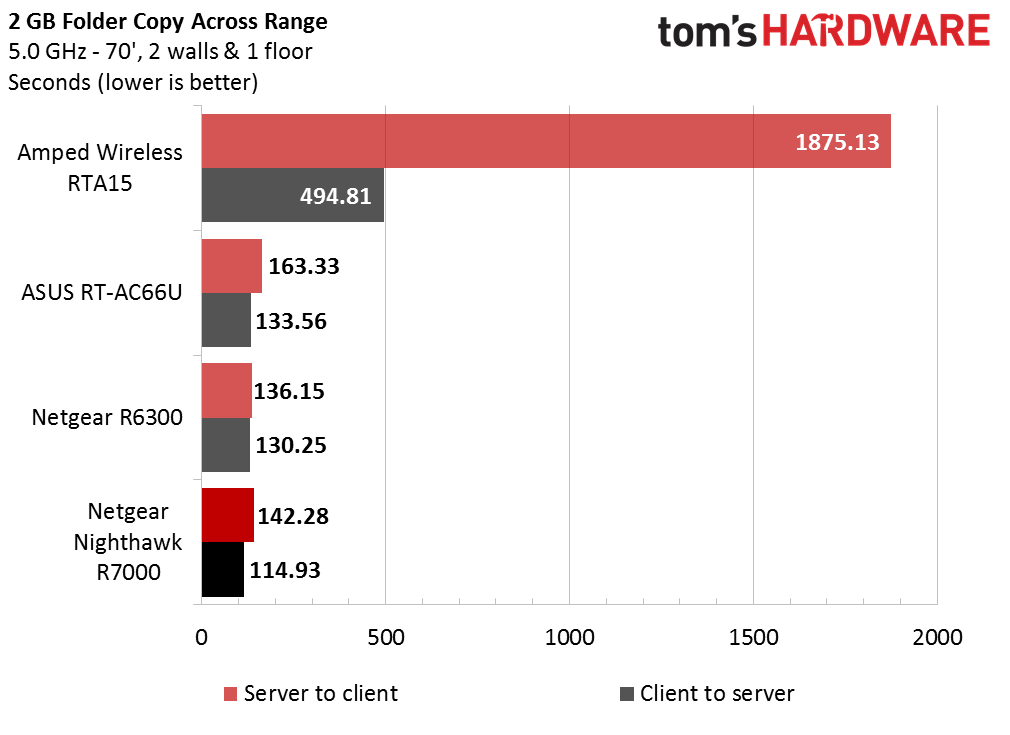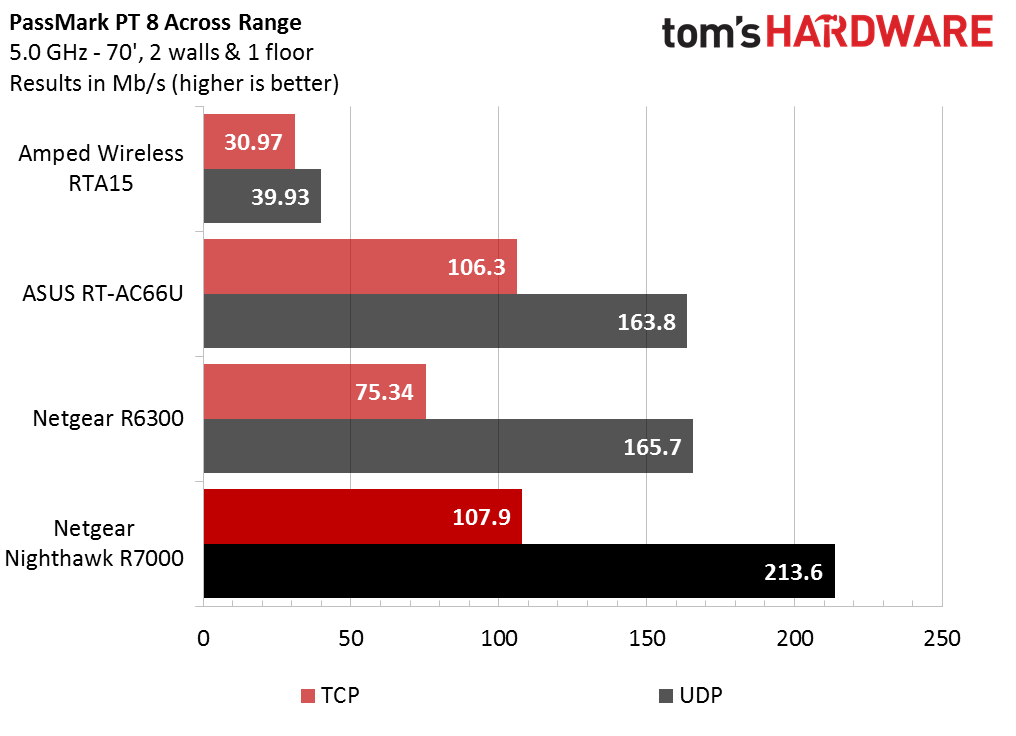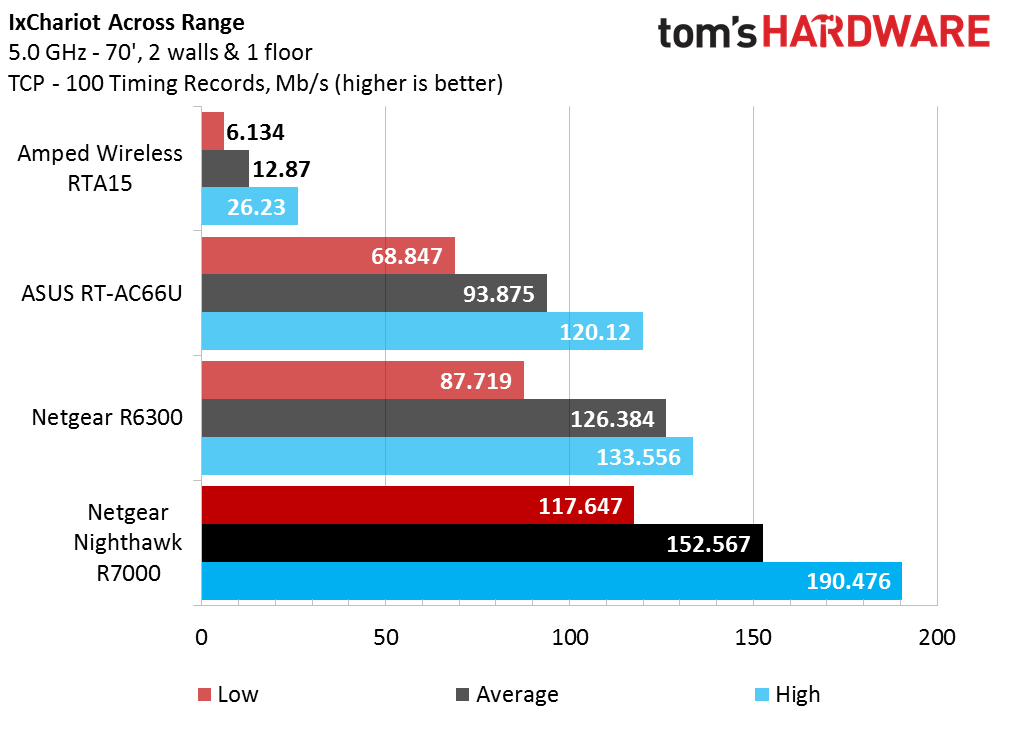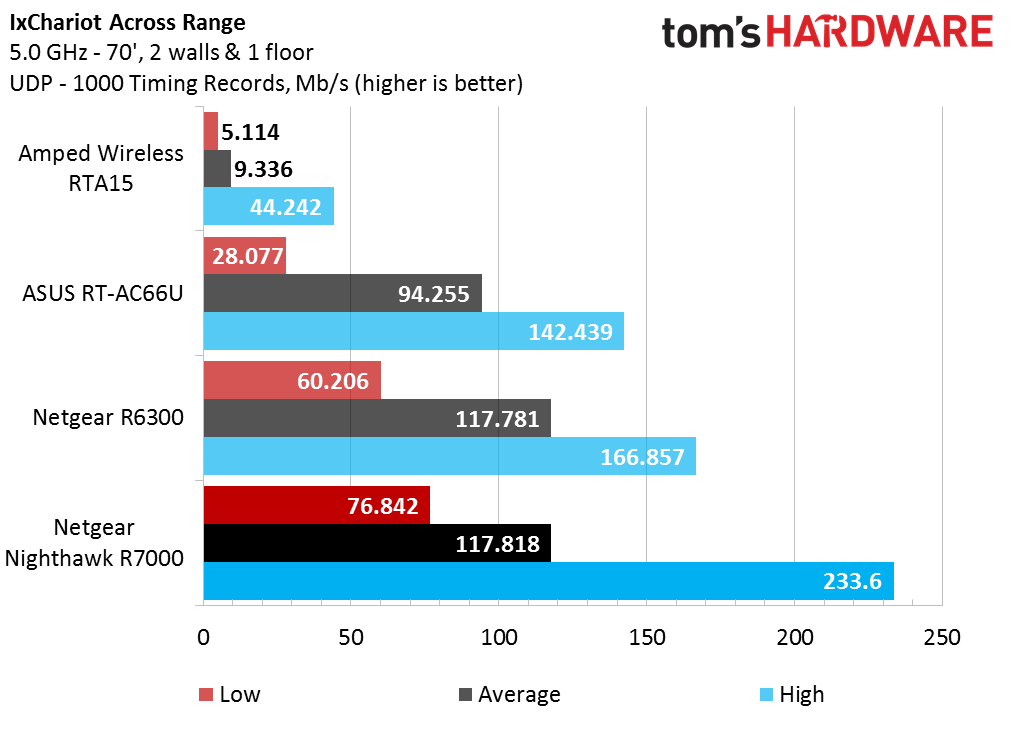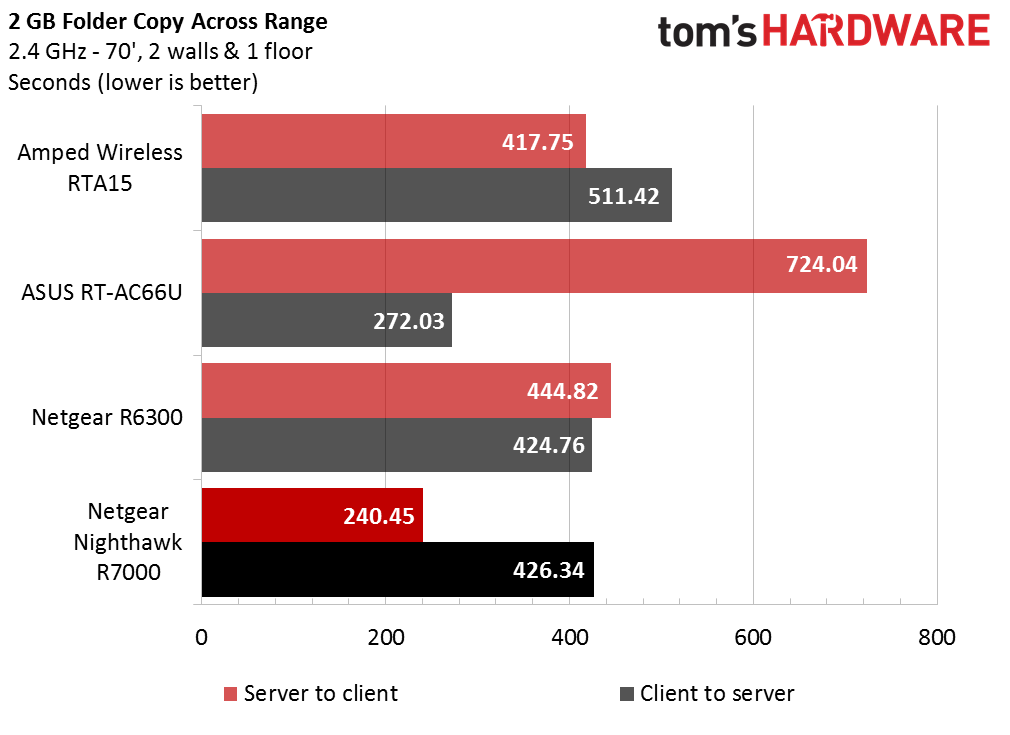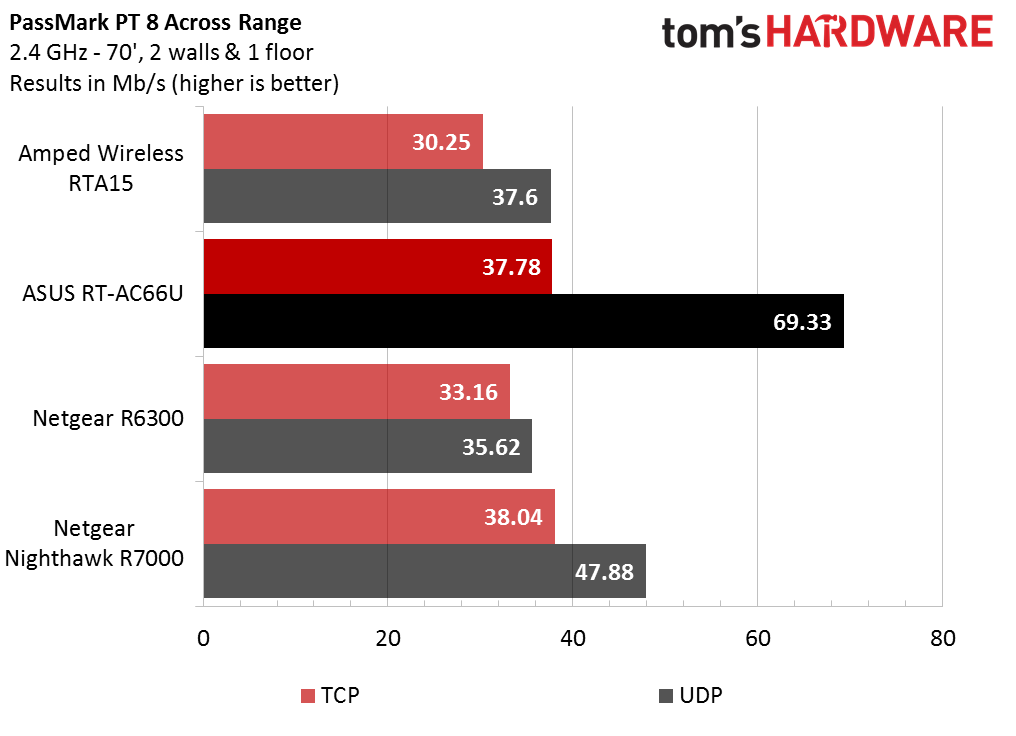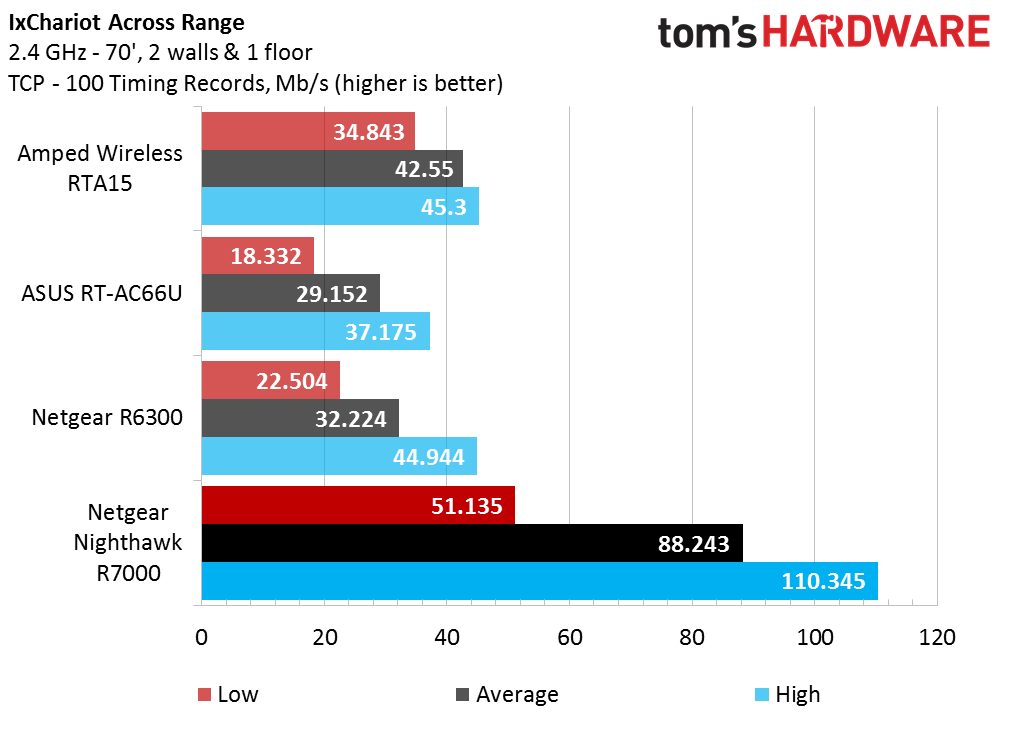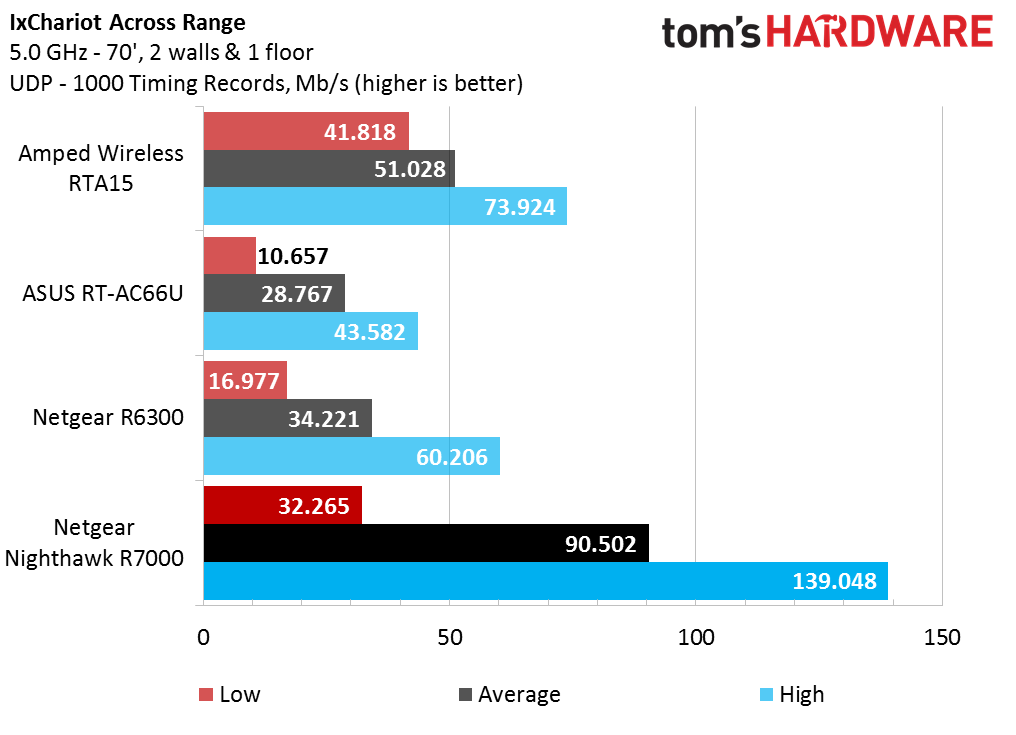802.11ac Wi-Fi Router Testing: Interference And Workloads
Performance Over Range
Time for more abuse. We moved our client system to the opposite end of the house and down to the lower level, thereby adding significant obstacles and distance to the wireless data path.
If there was any doubt about the necessity of having three antennas, whether power-boosted or not, this should lay the issue to rest. Differences between the Asus, R6300, and Nighthawk almost seem insignificant in comparison.
Any concerns about hitting a ceiling in PassMark are long gone. At best, the Nighthawk delivers half of the TCP throughput realized on our baseline test. Asus and the R6300 get whacked in approximately similar amounts. And poor Amped is left holding its innards, 90% of its lifeblood lost over the 70-foot distance.
Our IxChariot 5GHz TCP results largely mirror those of PassMark. Netgear’s Nighthawk once more emerges as the easy victor, losing half of its throughput while competitors take on far more damage.
Interestingly with UDP traffic, both Netgear routers emerge nearly unscathed. Asus takes a hard knock to its performance floor but still manages to keep its average throughput largely intact. Only Amped takes another body blow. The key take-away here is this: if you’re going to stream data over a long and/or obstructed path, particularly if using the inherently shorter-range 5GHz band, try to give preference to UDP-based applications (such as video streaming) and make sure your router has three or more antennas.
Very quickly, let’s spin through the 2.4GHz range comparisons and see if they fare any better or worse than 5GHz.
Once again, we see added distance and obstacles wreak havoc with copy times—with two exceptions. On the client-to-server transfer, Asus only takes about a 20% hit to its performance. That same test for the Nighthawk takes nearly twice as long as the baseline, but the Nighthawk’s server-to-client test takes a measly two seconds longer than the baseline.
Get Tom's Hardware's best news and in-depth reviews, straight to your inbox.
With PerformanceTest, we see the stressed routers lose roughly half of their throughput. More significantly, note how the distinct gap between TCP and UDP performance in the baseline all but disappears in the range results. Asus is the only model to keep its UDP speed up, which is why it won this test.
Once again, the Nighthawk shows its fortitude under IxChariot. Amped, Asus, and the R6300 each take a 2x to 4x performance shave. But the Nighthawk’s TCP numbers barely suffer. Impressive.
UDP tells the same story as TCP.
Current page: Performance Over Range
Prev Page Performance With Interference Next Page IxChariot TCP And UDP Multipair-
jacobian In "How we tested" you didn't specify what kind of wi-fi hardware the test clients had. Was it PCIe or USB network adapter? What kind of MIMO setup, e.g. 3x3 or 2x2?Reply
-
chimera201 I would like to see tear-down of routers to see the components for making a guess at longevity.Reply -
CaedenV This was a much better test setup, and a really interesting read. Only complaint was that the nighthawk may have an unfair advantage in the interferance tests compared to the other units as it went up against the 66U instead of another nighthawk. Perhaps you could dig up a 5GHz N router to act as a standard interference device next time? Or find a cheap AC router? It would make it a much better apples-to-apples comparison.Reply
At any rate, great article! I will certainly send this to my more tech-savvy friends who are looking to upgrade from N right now. I have the 66U in my own home and this seems to be spot-on which what I experience relating to distance and obstructions. It is not necessarily the fastest router on the market, but it is nice an consistent which has merits. -
dgingeri Home router security is so poor, I wouldn't even think of using one. Let me guess, they all have WPS, right? HUGE security hole that nobody ha made one little tiny step in fixing, and is "featured" on nearly every home router.Reply -
Larry Litmanen I use to have constant WiFi issues, one day i went out and got the best router i could, still had issues. Calling them for support was hell, 45 minutes on the phone just to be told "Sorry sir but there's nothing wrong with our router, your internet is down".Reply
I found out that my cable/internet company provides a free router, they hooked it up..............no issues since. Heck they just gave me a free AC router that can be controlled from internet.
I will not be buying any more routers. -
@dgingeri, I've never seen a router that didn't have the option to disable WPS. And WPS is better than nothing for non-technical people.Reply
Cool article. -
dgingeri Reply15852608 said:@dgingeri, I've never seen a router that didn't have the option to disable WPS. And WPS is better than nothing for non-technical people.
Cool article.
WPS can't be turned disabled by software. That's the big problem with it. My last two routers and one AP got hacked through WPS, even though it was disabled in software. That's when I learned that it doesn't actually get turned off. The only way to protect against the WPS security hole is if the software running the router or AP doesn't support WPS. This can be done by either getting an AP or router without that feature (quite difficult and rather expensive) or putting an opensource software on your router that doesn't have support for WPS (more difficult, but somewhat less expensive.)
As for "better than nothing for non-technical people", that's pretty much asinine. That's like saying "someone can't operate the key, so we'll leave this side door open." -
dgingeri Reply15852434 said:I use to have constant WiFi issues, one day i went out and got the best router i could, still had issues. Calling them for support was hell, 45 minutes on the phone just to be told "Sorry sir but there's nothing wrong with our router, your internet is down".
I found out that my cable/internet company provides a free router, they hooked it up..............no issues since. Heck they just gave me a free AC router that can be controlled from internet.
I will not be buying any more routers.
Did you know the ISP free routers have a back door for support purposes. They couldn't support them if they didn't have that back door. The big problem with that is that every support person, and former support person, for that company knows that back door. A vengeful or malicious former employee could easily hack into any customer's router and insert tracking software or "listen in" on the internet traffic, capturing all your passwords. They also have other massive security holes. ISPs patch their router firmware for bugs or security holes even less often than home router manufacturers. They aren't safe.
-
liquidpower this is the most important part of the Client how could you not included it?ReplyIn "How we tested" you didn't specify what kind of wi-fi hardware the test clients had. Was it PCIe or USB network adapter? What kind of MIMO setup, e.g. 3x3 or 2x2?
-
bikeracer4487 So in the "Performance without Encryption" section, in the very first test you test how long it takes to copy a 2GB folder, with the results measured in seconds. The AC66U wins with the lowest time, and the R6300 having the SLOWEST time...and yet you wrote this: "The exception is the R6300, which takes a 10% to 20% jump. This is a strong enough leap to propel it into first place in our test. Could it be that the R6300 is in fact a far more capable speedster being held back by encryption processing? Or is it just luck and variable ambient test conditions?"Reply
